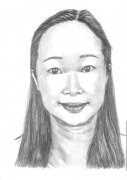|
济慈(1795—1821)是19世纪英国著名浪漫主义诗人。生于伦敦一个马夫家庭。由于家境贫困,诗人不满16岁就离校学医,当学徒。1816年,他弃医从文,开始诗歌创作。1817年诗人出版第一本诗集。1818年,他根据古希腊美丽神话写成的《安狄米恩》问世。此后诗人进入诗歌创作的鼎盛时期,先后完成了《伊莎贝拉》、《圣亚尼节前夜》、《许佩里恩》等著名长诗,还有最脍炙人口的《夜莺颂》、《希腊古瓮颂》、《秋赋》等诗歌。也是在1818年,诗人爱上了范妮·布恩小姐,同时诗人的身体状况也开始恶化。在痛苦、贫困和甜蜜交织的状况下,诗人写下了大量的著名诗篇。1821年,诗人前往意大利休养,不久病情加重,年仅25岁就离开了人世。
《夜莺颂》是1818年济慈23岁的作品。那年,诗人患上了肺痨,同时诗人还处于和范妮·布劳恩小姐的热恋中。正如诗人自己说的,他常常想的两件事就是爱情的甜蜜和自己死去的时间。在这样的情况下,诗人情绪激昂,心中充满着悲愤和对生命的渴望。在一个深沉的夜晚,在浓密的树枝下,在鸟儿嘹亮的歌声中,诗人一口气写下了这首8节80多行的《夜莺颂》。 My heart aches, and a drowsy numbness pains My sense, as though of hemlock I had drunk, Or emptied some dull opiate to the drains One minute past, and Lethe-wards had sunk 'Tis not through envy of thy happy lot, But being too happy in thine happiness,-- That thou, light-winged Dryad of the trees In some melodious plot Of beechen green, and shadows numberless, Singest of summer in full-throated ease. O, for a draught of vintage! that hath been Cool'd a long age in the deep-delved earth, Tasting of Flora and the country green, Dance, and Provencal song, and sunburnt mirth! O for a beaker full of the warm South, Full of the true, the blushful Hippocrene, With beaded bubbles winking at the brim, And purple-stained mouth That I might drink, and leave the world unseen, And with thee fade away into the forest dim Fade far away, dissolve, and quite forget What thou among the leaves hast never known, The weariness, the fever, and the fret Here, where men sit and hear each other groan; Where palsy shakes a few, sad, last gray hairs, Where youth grows pale, and spectre-thin, and dies; Where but to think is to be full of sorrow And leaden-eyed despairs, Where Beauty cannot keep her lustrous eyes, Or new Love pine at them beyond to-morrow. Away! away! for I will fly to thee, Not charioted by Bacchus and his pards, But on the viewless wings of Poesy, Though the dull brain perplexes and retards Already with thee! tender is the night, And haply the Queen-Moon is on her throne, Cluster'd around by all her starry Fays; But here there is no light, Save what from heaven is with the breezes blown Through verdurous glooms and winding mossy ways. I cannot see what flowers are at my feet, Nor what soft incense hangs upon the boughs, But, in embalmed darkness, guess each sweet Wherewith the seasonable month endows The grass, the thicket, and the fruit-tree wild; White hawthorn, and the pastoral eglantine; Fast fading violets cover'd up in leaves; And mid-May's eldest child, The coming musk-rose, full of dewy wine, The murmurous haunt of flies on summer eves. Darkling I listen; and, for many a time I have been half in love with easeful Death, Call'd him soft names in many amused rhyme, To take into the air my quiet breath; Now more than ever seems it rich to die, To cease upon the midnight with no pain, While thou art pouring forth thy soul abroad In such an ecstasy! Still wouldst thou sing, and I have ears in vain-- To thy high requiem become a sod. Thou wast not born for death, immortal Bird! No hungry generations tread thee down; The voice I hear this passing night was heard In ancient days by emperor and clown: Perhaps the self-same song that found a path Through the sad heart of Ruth, when, sick for home, She stood in tears amid the alien corn; The same that oft-times hath Charm'd magic casements, opening on the foam Of perilous seas, in faery lands forlorn. Forlorn! the very word is like a bell To toll me back from thee to my sole self! Adieu! the fancy cannot cheat so well As she is fam'd to do, deceiving elf. Adieu! adieu! thy plaintive anthem fades Past the near meadows, over the still stream, Up the hill-side; and now 'tis buried deep In the next valley-glades: Was it a vision, or a waking dream? Fled is that music:--Do I wake or sleep? |




